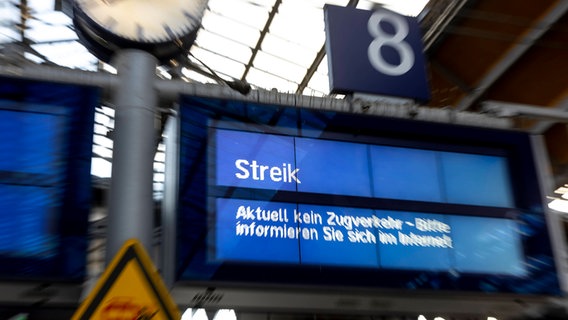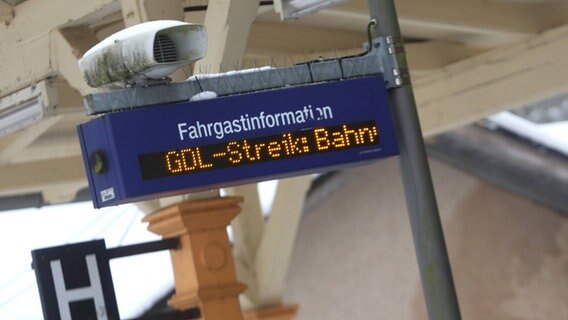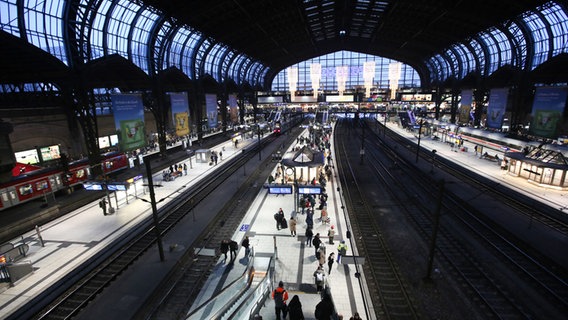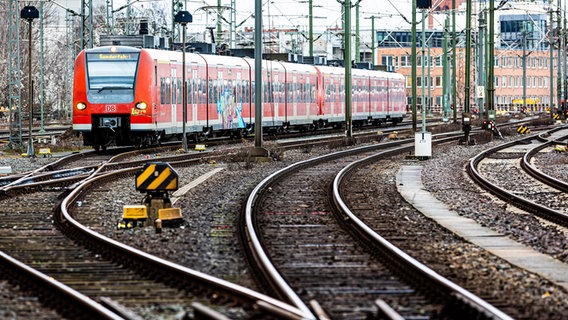
As of: January 22, 2024 11:40 pm
The train drivers' union GDL has again called for Deutsche Bahn workers to strike. The union has announced that it will begin on Wednesday at 2 am on passenger transport and last until 6 pm on Monday next week.
Union members at DP Cargo, which is responsible for freight transport, have called for a strike from Tuesday.
Just on Friday Deutsche Bahn (DB) launched a new fare offer. It also includes an option for one hour less working hours for train drivers and train attendants from January 1, 2026. However, this is not enough for new negotiations. “With the third and allegedly improved offer, Deutsche Bahn has shown once again that it is unhesitatingly continuing its previous course of denial and confrontation – with no desire to reach an agreement,” the GDL statement said.
Ban calls the plans “irresponsible.”
DB criticized the renewed strike notice: “DB relies on compromises, GDL is exaggerating and escalating the conflict,” explained a railway spokesperson. “Anyone who doesn't come to the negotiating table with a new offer of up to 13 per cent and the possibility of 37 hours a week with the same salary is being completely irresponsible.” According to its own statements, the Railways does not intend to take legal action against the strike announced this time.
There was also criticism from Federal Transport Minister Volker Vissing (FDP). A solution can only be found if we negotiate with each other. According to Wissing, collective bargaining conflicts “must be resolved and not left”. Chancellor Olaf Scholes (SPD) said he wanted quick and constructive talks – but he did not want to get into a confrontation. The Greens spoke in favor of arbitration.
The emergency timetable is intended to ensure limited train delivery
DB expects “massive disruption” to long-distance, regional and S-Bahn traffic during the strike. If you already have a ticket for a journey from Wednesday, you can bring it forward, the railways said. So tickets can be used or canceled at a later date. Rush timetable ensures only very limited train supply in regional and long-distance transport DB website. As in previous strikes, longer trains with more seats were to be used “to bring as many people as possible to their destination”.
Lower Saxony: some lines every two hours
In Lower Saxony, trains on route RB44 / RB 48 (Braunschweig – Salzgitter-Lebenstedt) are expected to be cancelled. On the other hand, trains occasionally RE1 (Norddeich (Mole) – Bremen Hbf – Hannover Hbf), RE9 (Osnabrück Hbf – (Bremen Hbf) – Bremerhaven-Lehe), RB40 (Osnabrück Hbf – (Bremen Hbf) – -Lehe).
According to information, lines RB45 (Braunschweig Hbf – Schöppenstedt) and RB46 (Braunschweig Hbf – Herzberg) run every two hours. A two-hourly service is also planned on at least some routes for RB80 / 81 (Göttingen/Bodenfelde – Nordhausen) and RB82 (Göttingen – Kreiensen – Bad Harzburg).
Metronom, Enno and Transdave trains, which include S-Bahn Hannover and NordWestBahn, are not involved in the strike. However, strikes at signal boxes, for example, can lead to timetable delays and cancellations.
More info
Schleswig-Holstein: Lübeck-Hamburg line every hour
In Schleswig-Holstein, the RB62 between Heide and Itzehoe and the RB85 from Lübeck to Neustadt may be cancelled. On the other hand, RE8 and RE80 run every hour between Lübeck and Hamburg. Regional train 81 from Bad Oldesloh to Hamburg should be served every two hours, as are trains on routes RE7 and RE70 between Hamburg, Neumünster and Kiel. According to Deutsche Bahn, trains are expected to run between Neumünster and Flensburg every three hours. Passengers will have to change trains at Newmanster.
The RE6 runs every three hours between Westerland in Sylt and Hamburg-Altona. Silt Shuttle Plus trains between Niebuhl and Westerland are open for local transport passengers.
Nordbahn, AKN and erixx are not affected by the strike in Schleswig-Holstein and intend to operate as planned. The X85 route from Budegarten to Lübeck is also not on strike.
More info
MV: Failures in Rostock S-Bahn transport
In Mecklenburg-Western Pomerania, the Rostock S-Bahn has been affected, a railway spokesman said. According to Deutsche Bahn, connections elsewhere will also be canceled without being changed. Train traffic between Eustom (RB23/ RB24), S-Bahn connections Warnemünde (S1) and Rostock, Laage and Güstrow (S3) and connections between Velgast and Barth (RB25) are particularly affected. RE1 lines run occasionally between Hamburg and Rostock and RE3 between Ankermünde and Berlin. Regional trains of East German Railways (Odeg) were not affected. “Basically we're driving,” a spokeswoman said Monday. However, if the signal box workers go on strike, it is said that it will also affect train passengers through OTEC.
More info
HAMBURG: Massive disruptions to S-Bahn traffic are expected
According to a spokesperson for S-Bahn Hamburg, hourly emergency services will be maintained every 20 minutes for S1, S2, S3 and S5, just like the last strike. Due to the specific length of the strike, both the Pro Bahn passenger union and the GDL anticipate major difficulties. As signal boxes are also going on strike, Metronome, Nordbahn and AKN may also experience outages, even if these companies are not on strike.
More info
The fourth strike is in an ongoing collective bargaining dispute
The strike announced today is the fourth strike in the ongoing collective bargaining dispute. Before the start of the year, GDL grounded large sections of passenger traffic in two warning strikes There was a three-day strike in January with similar results.
Delivered on Friday The Railways' offer gives employees a 4.8 per cent bonus from August and another five per cent from April 2025. Additionally, payment of the inflation compensation premium is scheduled immediately after a potential collective bargaining agreement. As per DB offer, tenure should be 32 months. Railways also offers to reduce the working hours of train drivers and train assistants from 38 hours to 37 hours with the same salary from 1 January 2026. Under the offer, anyone who decides against the cuts will get an extra 2.7 percent instead. In total, employees who keep their current working hours will receive 13 percent more gross pay than they do now. The GDL is demanding an increase of 555 euros per month, as well as an inflation compensation bonus for a twelve-month period.
More info







